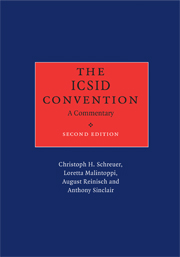Book contents
- Frontmatter
- Contents
- Foreword by Professor Sir Elihu Lauterpacht, CBE, QC
- Authors' preface to the second edition
- Table of cases
- List of abbreviations
- Text of the ICSID Convention
- Procedural calendar
- PREAMBLE
- CHAPTER I International Centre for Settlement of Investment Disputes
- CHAPTER II Jurisdiction of the Centre
- CHAPTER III Conciliation
- Article 28 Request for Conciliation
- Article 29 Composition of Commission
- Article 30 Appointment by Chairman
- Article 31 Qualities of Conciliators
- Article 32 Decision on Jurisdiction
- Article 33 Rules on Procedure
- Article 34 Conciliation Proceedings and Report
- Article 35 Non-Invocation in Subsequent Proceedings
- CHAPTER IV Arbitration
- CHAPTER V Replacement and Disqualification of Conciliators and Arbitrators
- CHAPTER VI Cost of Proceedings
- CHAPTER VII Place of Proceedings
- CHAPTER VIII Disputes between Contracting States
- CHAPTER IX Amendment
- CHAPTER X Final Provisions
- Final Clause
- Consolidated bibliography
- Index by article
- Index by subject
Article 33 - Rules on Procedure
from CHAPTER III - Conciliation
Published online by Cambridge University Press: 07 September 2010
- Frontmatter
- Contents
- Foreword by Professor Sir Elihu Lauterpacht, CBE, QC
- Authors' preface to the second edition
- Table of cases
- List of abbreviations
- Text of the ICSID Convention
- Procedural calendar
- PREAMBLE
- CHAPTER I International Centre for Settlement of Investment Disputes
- CHAPTER II Jurisdiction of the Centre
- CHAPTER III Conciliation
- Article 28 Request for Conciliation
- Article 29 Composition of Commission
- Article 30 Appointment by Chairman
- Article 31 Qualities of Conciliators
- Article 32 Decision on Jurisdiction
- Article 33 Rules on Procedure
- Article 34 Conciliation Proceedings and Report
- Article 35 Non-Invocation in Subsequent Proceedings
- CHAPTER IV Arbitration
- CHAPTER V Replacement and Disqualification of Conciliators and Arbitrators
- CHAPTER VI Cost of Proceedings
- CHAPTER VII Place of Proceedings
- CHAPTER VIII Disputes between Contracting States
- CHAPTER IX Amendment
- CHAPTER X Final Provisions
- Final Clause
- Consolidated bibliography
- Index by article
- Index by subject
Summary
Art. 33 is substantively identical to Art. 44, its counterpart in the Chapter on Arbitration. The only difference is the substitution of “conciliation” and “Conciliation Rules” for “arbitration” and “Arbitration Rules” and “Commission” for “Tribunal”.
The early drafts to the Convention sought to give some influence to conciliation commissions on the choice of procedural rules. A plan to subject an agreement of the parties on the adoption of conciliation rules to the commission's approval was dropped (History, Vol. I, pp. 158, 160; Vol. II, pp. 264, 327/8, 414, 479, 510). Starting with the First Draft, the drafts to what became Arts. 33 and 44 were substantively identical and the two provisions were mostly discussed together (at pp. 791, 946–947) (see Art. 44, paras. 2, 11, 32, 43, 44, 53).
In view of the near identity of Arts. 33 and 44, the provisions of Art. 33 should be read in the light of the applicable parts of this Commentary on Art. 44.
The Conciliation Rules are adopted by the Centre's Administrative Council in accordance with Art. 6(1)(c). The Conciliation Rules were adopted on 25 September 1967 with effect from 1 January 1968. On 26 September 1984, the Administrative Council adopted revisions to the Rules which took effect immediately. The 1968 version of the Conciliation Rules continues to apply to consents given before 26 September 1984.
- Type
- Chapter
- Information
- The ICSID ConventionA Commentary, pp. 441 - 442Publisher: Cambridge University PressPrint publication year: 2009



